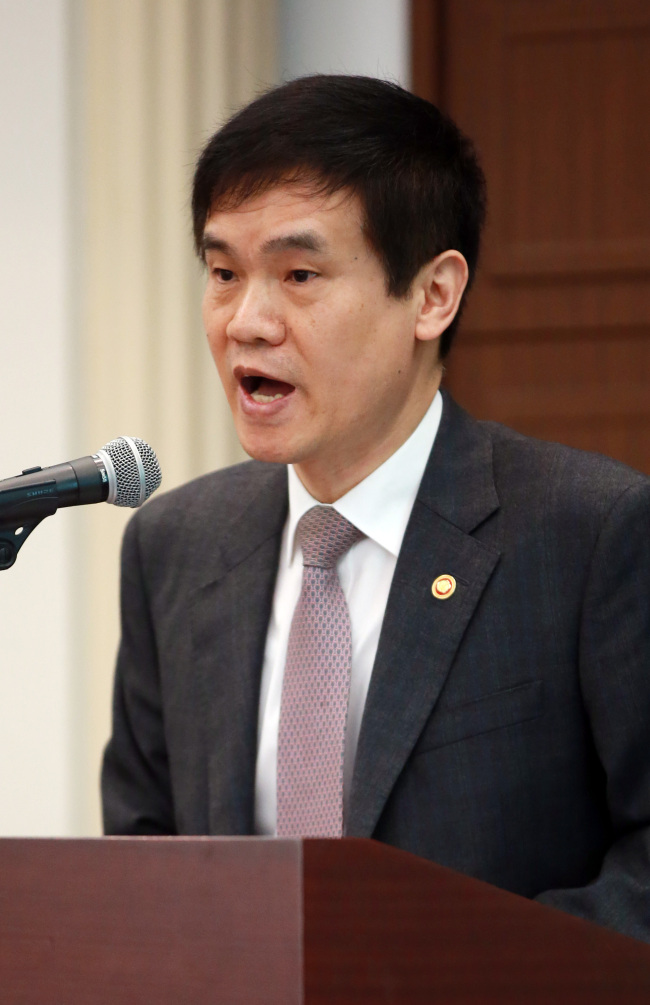The state-run anticorruption body on Thursday held a policy briefing for foreign businesses in Korea, at which it introduced antigraft policies to fight corruption including a hotly contested act against illegal solicitation by public officials.
“The Korean government is making multidimensional endeavors for (creating) a transparent government and society in order to address various issues caused by corruption and support business activities,” said Lee Sung-bo, the head of the Anti-Corruption and Civil Rights Commission. “To that end, we are making efforts for a rapid enactment of the ‘Act on the Prevention of Illegal Solicitation’ in order to prevent public officials from seeking unjust personal gains.”
“The Korean government is making multidimensional endeavors for (creating) a transparent government and society in order to address various issues caused by corruption and support business activities,” said Lee Sung-bo, the head of the Anti-Corruption and Civil Rights Commission. “To that end, we are making efforts for a rapid enactment of the ‘Act on the Prevention of Illegal Solicitation’ in order to prevent public officials from seeking unjust personal gains.”

The Act on the Prevention of Illegal Solicitation proposes criminal punishment for public officials who receive money, products or services that reach or exceed 1 million won ($910) in value. It is currently pending at the Legislation and Judiciary Committee of the National Assembly.
The antigraft act has been in limbo since Kim suggested it in 2012, but resurfaced last year following a ferry accident in April that left over 300 dead or missing. The accident revealed a network of corruption involving both public and private sector officials. Under the growing public outcry against corruption among civil servants, the act was finally passed by a parliamentary subcommittee in January, 17 months after it had first been presented to the lawmakers.
But the act ― which originally targeted civil servants ― has become a hot issue since lawmakers expanded the scope of the bill to include the media and private school teachers.
Rep. Lee Sang-min of the main opposition New Politics Alliance for Democracy, who chairs the parliamentary legislation committee, said the lawmakers should accept the original version of the bill. He said that the current version of the act has parts that could be seen as unconstitutional.
“It is not appropriate to label (the act itself) as unconstitutional, just because it applies to a wider range of people,” ACRC chief Lee recently said in a meeting with reporters. But he acknowledged that there needed to be sufficient discussion on whether or not to apply the anticorruption act to nonpublic officials as well.
In addition, Lee said the ACRC was promoting the enactment of a bill to prevent false claims on public finances that will help the government prevent wasteful budget items. The ACRC is also set to revise an act on protecting whistleblowers, which will encourage more anonymous reporting of corruption in various sectors, he added.
The ACRC has been hosting an annual policy briefing for foreign business leaders here, offering them a chance to raise suggestions and complaints about difficulties they have encountered while acquiring information on policy changes. Participants at this year’s event included James Kim, chairman of the American Chamber of Commerce in Korea; Toni Schreibweiss, European Chamber of Commerce in Korea vice chairman; and Hiroe Tadashi, Seoul Japan Club vice chairman.
By Yoon Min-sik (minsikyoon@heraldcorp.com)








![[KH Explains] Hyundai's full hybrid edge to pay off amid slow transition to pure EVs](http://res.heraldm.com/phpwas/restmb_idxmake.php?idx=644&simg=/content/image/2024/04/18/20240418050645_0.jpg&u=20240419100350)







![[From the Scene] Monks, Buddhists hail return of remains of Buddhas](http://res.heraldm.com/phpwas/restmb_idxmake.php?idx=652&simg=/content/image/2024/04/19/20240419050617_0.jpg&u=20240419175937)

![[KH Explains] Hyundai's full hybrid edge to pay off amid slow transition to pure EVs](http://res.heraldm.com/phpwas/restmb_idxmake.php?idx=652&simg=/content/image/2024/04/18/20240418050645_0.jpg&u=20240419100350)

![[Today’s K-pop] Illit drops debut single remix](http://res.heraldm.com/phpwas/restmb_idxmake.php?idx=642&simg=/content/image/2024/04/19/20240419050612_0.jpg&u=)